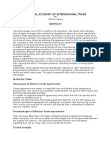POLITICAL ECONOMY OF INTERNATIONAL TRADE
By Alfonso Llanes
The short answer to US FTA's is politics not economics. The Trump Administration likes to apply leverage when conducting negotiations about any issue, specifically, bilateral trade agreements where the US economy towers any country's GDP and it can exercise its weight. The argument goes that in multilateral trade agreement the US is one of many countries entering the agreement and its GDP can be dwarfed by the cumulative GDP's of the countries entering the agreement, therefore, little leverage can be exercise which was the case of TPP. In order to understand the overall picture of how international trade affects the economies of participating countries it is necessary to start with the basics. By definition: Bilateral trade agreements are between two nations which gives them favored trading status with each other. The goal is to increase each country's economic growth. Bilateral agreements are made in order to cover five general areas where they standardize business operations, to level the playing field. That keeps one country from copying the other's innovative products, dumping products, or using unfair subsidies. Additionally, these agreements also standardize regulations, labor standards and environmental protections. A prime issue of the agreement is the elimination of tariffs and other trade taxes. This gives companies within both countries a price advantage.